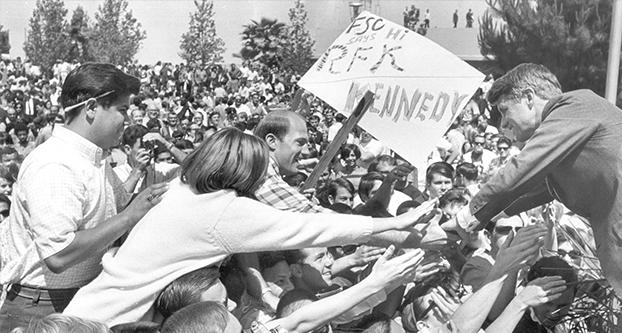By: Dennis McCall
Collegian Executive Editor
Published April, 22, 1968
Sen. Robert F. Kennedy reiterated his call for bringing a new kind of leadership to the United States through a “spirit of youth” as he addressed a sun-warmed audience of more than 5,000 in the Fresno State College Amphitheatre Friday.
The youthful, vibrant Democratic presidential hopeful received a polite but not overly enthusiastic reception when he arrived at FSC on part of a brisk campaign swing through California. The subdued greeting here was in direct contrast to a thunderous reception the night before when he arrived by chartered jet at the Fresno Air Terminal. There he was greeted by 4,500 screaming, chanting admirers.
Kennedy said the spirit of youth he speaks of is “not a time of life but a spirit of mind, a temperature of the will,” a quality of imagination and a predominance of courage over timidity of the appetite for adventure. It is the spirit which knows the difference between force and reason.

“I stand with the spirit of youth and that is where I think America stands. And, that is why I run for president.”
The junior senator from New York made no startling announcements during his brief speech and keyed his remarks heavily on the Vietnam War and negotiating a peace settlement.
Kennedy, who quelled his criticism of President Johnson after the president’s surprising decision not to see reelection, renewed his foray on the chief executive by attacking the administration’s statement to go anywhere, anytime to seek a negotiated peace.
“Two weeks ago we were enormously heartened by the president’s initiative toward preliminary talks,” Kennedy said. “Yet, despite our pledge to go anytime, any place to seek a negotiated end to the war, those preliminary talks ”” much less negotiations ”” have yet to begin.”
He said the U.S. should have made it clear at the beginning that it would not accept certain locations for peace talks. Kennedy drew an enthusiastic response when he spoke of shifting major efforts from the war to more pressing domestic problems on the home front. Citing cutbacks in education and poverty programs at home, Kennedy called for a chance in policy “to focus attention on the needs of our own people.”
Drawing once again on his spirit slogan, Kennedy said, “It seems to me, that spirit can bring back another kind of leadership to this country ”” a new leadership that understands the purpose of a nation is not fulfilled by the mere accumulation of wealth.
“Above all, this spirit of the conviction of possibility. This is the spirit that I want to see returned to the United States of America and it is the reason I run for President.”
The senator’s stopover at FSC took on a brighter lustre when Kennedy opened his talk to questions from the audience. His wit and quick, unhesitant answers seemed to impress the overflow crowd and drew frequent applause and laughter.
While his prepared test was quite similar to other speeches he has delivered on college campuses, the question-answer period was fresh and lively.
In answering the queries, Kennedy touched on a variety of topics, everything from riots and wars (both in Vietnam and the Middle East) to poverty and the Pueblo incident.
His comments on how he would handle the Vietnamese war drew heavy attention and frequent applause. Kennedy would like to get to the negotiating table as soon as possible and said the U.S. missed golden opportunities to negotiate two years ago and again last year.
Kennedy called for an increased effort to the part of South Vietnamese, less use of American troops in the Demilitarized Zone and a de-escalation of fighting.
“I would have the conflict and effort taken over by the Vietnamese,” he urged. “I think we should make it clear to them that we demand they have a general mobilization. This is their war, their conflict.
“And I would truly go anyplace, anytime to meet with our adversaries to conduct negotiations.”
Kennedy said he would work to break down the racial crisis launching programs aimed at providing education and job training for minority groups. He favors giving tax credit to “the private sector” to get jobs for the hard core unemployed.
Asked if he would bring peace to the Middle East if elected president, Kennedy firmly replied, “yes,” then qualified it with, “I’d need some help from the Arabs and Israelis.”
On the Pueblo incident, Kennedy said the captured U.S. spy ship should not have been where it was offshore from North Korea without adequate military cover. He advocates negotiations to obtain the release of the ship’s 82 crewmen, held captive since the vessel was seized.
Kennedy’s stay on campus lasted a little more than an hour. Before and after his on-stage appearance he was mobbed by well-wishers and admirers seeking a handshake with the popular younger brother of the late John F. Kennedy.
There was little organized opposition to Kennedy while at FSC. One group of students carried signs supporting television comedian Pat Paulsen for president.
Kennedy met the challenge head-on. “I resent the signs over there for Pat Paulsen. I think he got in the race too late. And, I’ve seen him on television and I think he’s ruthless and shouldn’t’ be allowed to run.”




